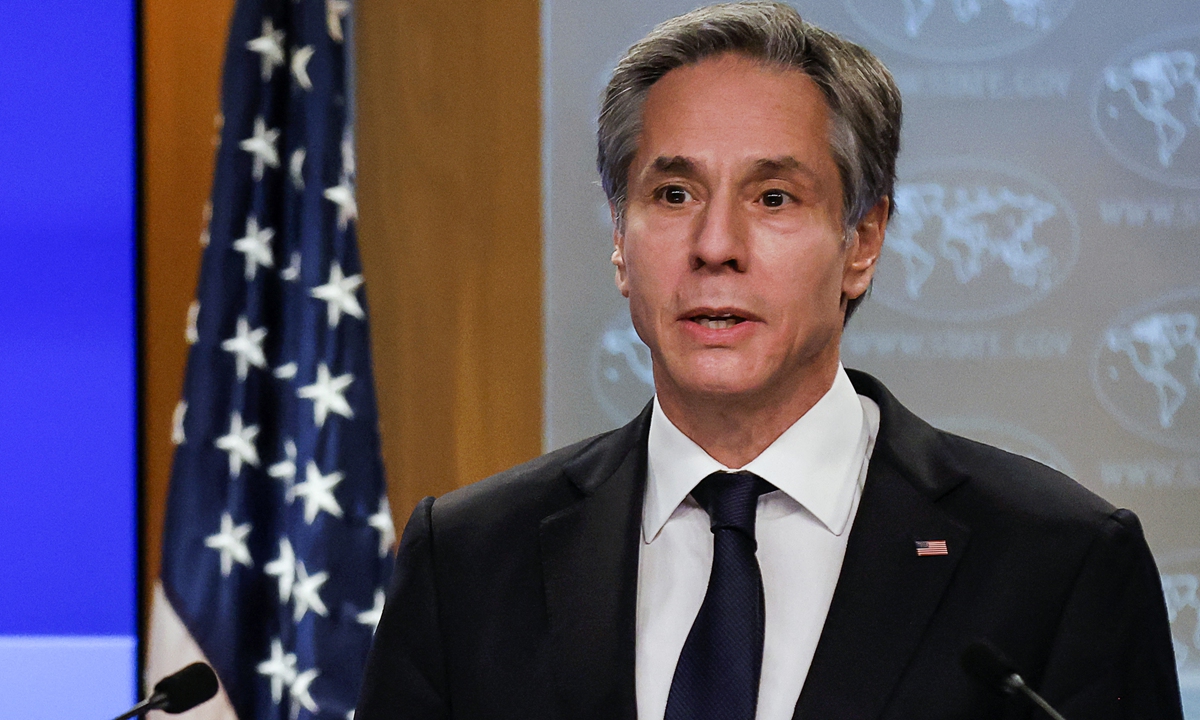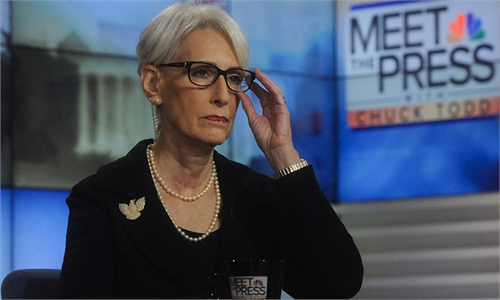US puts together security-focused PBP clique to contain China, disregards Pacific Island nations’ interests

Antony Blinken Photo: AFP
US Secretary of State Antony Blinken hosted officials of Partners in the Blue Pacific (PBP) countries on the sidelines of the United Nations General Assembly on Thursday, while analysts pointed out that the PBP event is another small clique pulled together by the US to push its Indo-Pacific Strategy with the aim of expelling China from the region and impeding China's cooperation with island nations in the Pacific, and that this kind of small clique will bring no benefit to island nations but only instability to the region.
Information about the PBP event was disclosed early this week, with some Western media reporting that the meeting would focus on coordinating assistance in the Pacific to help countries in the region as they face an "existential" threat from climate change and an impact on the economy from the COVID-19 pandemic.
The PBP was formed in June by the US, Australia, Japan, New Zealand and the UK. South Korea, France and Germany are reportedly considering joining it.
By changing the name and not the content, the PBP is another small clique that the US has drawn together to contain China, Chen Hong, president of the Chinese Association of Australian Studies and director of the Australian Studies Centre at East China Normal University, told the Global Times on Thursday.
The US' Indo-Pacific Strategy has failed to make major achievements as some countries - India, for example - have not given an active response, which is why the US has continued to push more small cliques, like AUKUS, QUAD and the PBP, said Chen, noting that the situation also highlighted the chaotic strategies the US and its allies have taken and demonstrated that to suppress China, the US has resorted to blind attacks.
During an event in New York, White House Indo-Pacific coordinator Kurt Campbell said they have seen in the last several years a "more ambitious China that seeks to develop footprints military and the like in the Indo-Pacific… that caused some anxiety with partners like Australia and New Zealand," Reuters reported.
Zhou Fangyin, a professor at the Guangdong Research Institute for International Strategies, said the US has pulled various small cliques to push its Indo-Pacific Strategy in all directions to contain China, with each clique having a different focus, from military and intelligence to economic and security cooperation. The PBP targets the security field.
After China and the Solomon Islands signed a security pact, the US seemed to become more worried and vigilant about China's increasing influence in the Pacific region, which reflected its zero-sum mentality, Zhou said.
Zhou noted that the US and its ally Australia have taken the Pacific region as their own sphere of influence and therefore resisted other countries' cooperation with the island countries. But it is the island countries that have the right to decide which country to cooperate with and in which field, and their cooperation with China is mutually beneficial.
After China and the Solomon Islands signed their security pact in April, the US and Australia ramped up efforts not only in smearing their cooperation but also reinforcing the pressure on Solomon Islands by sending a string of senior officials to visit, including US Deputy Secretary of State Wendy Sherman and newly appointed US ambassador to Australia Caroline Kennedy in July and August.
Besides the PBP event on Thursday, US President Joe Biden reportedly planned to host Pacific leaders at a summit on September 28 and 29 in Washington as part of efforts to step up ties with the region.
Under the excuse of helping island nations, the US wants to build a closed circle in the South Pacific, expelling and suppressing China and impeding China's cooperation with island nations in the area, Chen said, noting that the PBP, for example, has a clear strategic meaning and was not made to help island nations develop, as it pulls in Britain and Japan, which have little relation to the livelihood of South Pacific countries.
Moreover, the US' declining strength cannot support its ambition, neither can it hoodwink its allies to follow its lead, as each country has its own plans for joining the PBP, said analysts.
For example, France, which has historically colonized territories in the Pacific region, wants to expand its global strategic influence by joining the PBP. But as a traditional ally of the US, its participation in the PBP can only increase the number of its members, and not increase its strength to contain China, not to mention its unresolved friction with Australia over an abandoned submarine deal, said Chen.
Chen believes that leaders of these countries have the political wisdom to see through the US' tricks, as many countries also oppose the US' using them as weapons to attack China. Island countries, which have suffered from imperialism and economic exploitation and were belittled by Western countries, will not easily be fooled or coerced by the US and its allies.
Analysts also pointed out that for Pacific island leaders, their current priorities are dealing with climate change and the impact brought by COVID-19, not competition between superpowers, and this is why they will keep their distance from any geopolitical games started by the US.

